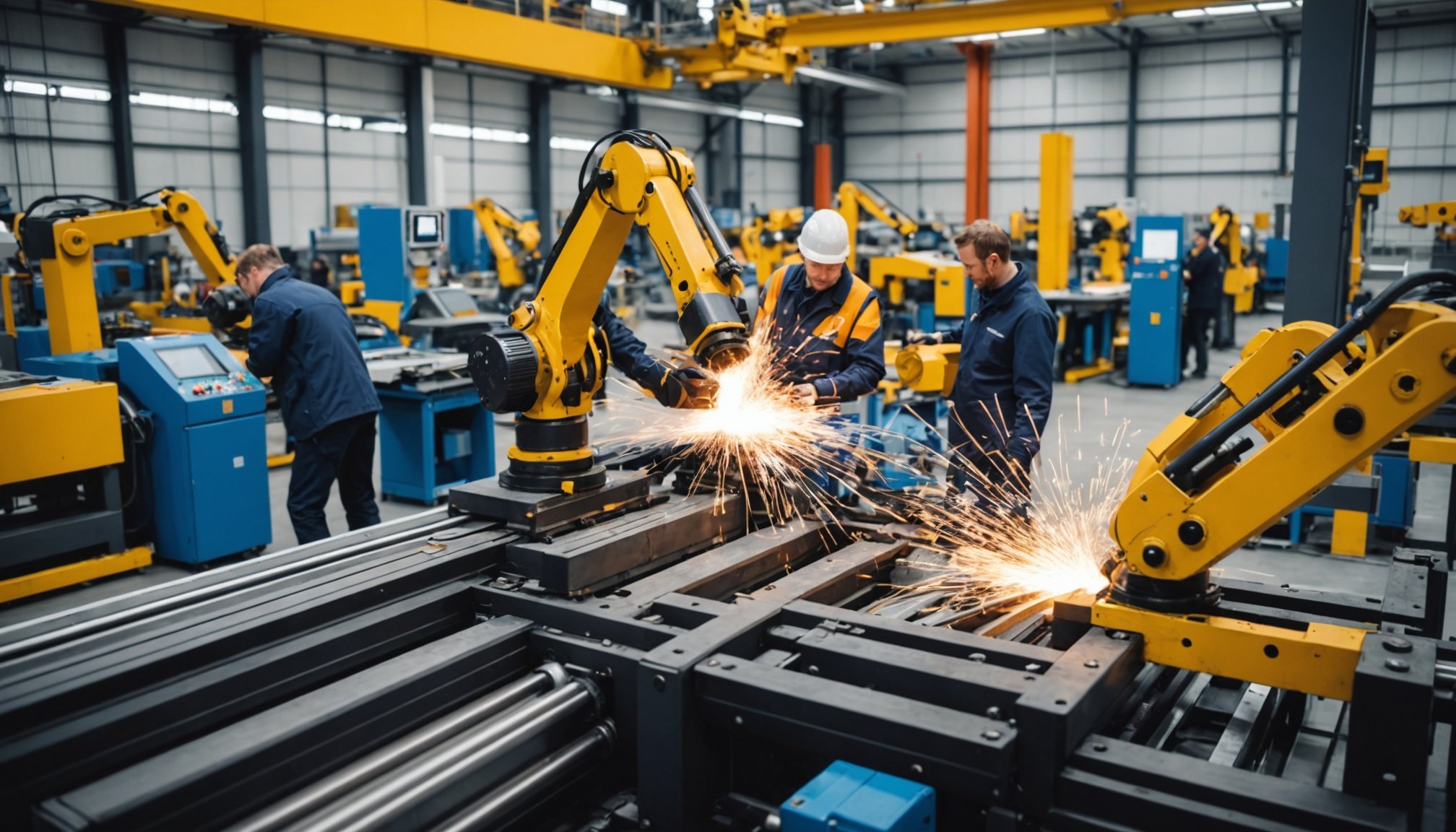Understanding Industry 4.0
Navigating the dynamic landscape of Industry 4.0 is vital for UK manufacturers aiming to remain competitive. This revolution is characterised by the integration of advanced technologies such as the Internet of Things (IoT), Artificial Intelligence (AI), and automation, fundamentally altering production methods. At its core, Industry 4.0 leverages smart systems to enhance efficiency and productivity, driving a significant impact on the global manufacturing landscape.
For UK manufacturers, embracing Industry 4.0 is not merely an option—it’s a necessity to stay relevant. Key technologies like IoT allow machines to communicate and share data, which optimises operations in real time. AI contributes to making informed decisions by analysing massive datasets quickly, while automation streamlines repetitive tasks, freeing human resources for more strategic functions.
Also to see : Unlocking transparency: key approaches for uk food producers to enhance supply chain traceability
The benefits extend beyond efficiency, promising adaptability in responding to market changes and consumer demands. This technological shift represents an opportunity to innovate and redefine business models. As UK manufacturers deploy these technologies, their potential to transform processes and products is vast, positioning them advantageously in the evolving global market arena.
Strategies for Technological Adoption
Navigating technological adoption is critical for UK manufacturers transitioning to Industry 4.0. Assessing the current technological landscape involves understanding existing capacities and identifying necessary upgrades. This step ensures informed decisions on implementing IoT and automation. Companies must conduct thorough audits of their operations to pinpoint areas for technological enhancement and identify how IoT and automation can optimise workflows.
Also read : Mastering cybersecurity: key strategies for uk businesses to effectively implement training programs
Successfully integrating IoT into existing operations requires a phased approach. Companies should start by connecting a limited number of devices to analyse data patterns and understand their systems’ needs. This allows for a smoother, more controlled adoption, minimising disruptions while enabling scalability.
Automation implementation should be strategic, beginning with highly repetitive tasks. This not only enhances efficiency but also maximises the productivity of the entire workforce. By automating mundane operations, resources can be reallocated to focus on tasks demanding creativity and critical thinking, thus improving overall business agility.
Success Stories
Numerous UK manufacturers serve as models for embracing advanced technologies. Firms like Rolls-Royce have harnessed IoT and automation to refine their manufacturing processes, resulting in significant improvements in productivity and product quality. Such examples demonstrate the tangible benefits of proactive technological adoption.
Workforce Development for the Future
Ensuring a future-ready workforce is crucial as UK manufacturers navigate Industry 4.0’s transforming landscape. Adjusting to this paradigm involves significant workforce development and targeted skills training.
Identifying Skills Gaps
Understanding the skills needed for the digital era is the first step. Industry 4.0 demands proficiency in data analysis, machine learning, and digital literacy. Identifying existing skills gaps helps tailor training initiatives to equip employees for the technological shift.
Developing Training Programs
Implementing effective training programs is essential to bridge these gaps. Hands-on workshops and e-learning modules focused on IoT, AI, and other advanced technologies foster a deeper understanding. Offering continuous professional development ensures employees keep pace with evolving technologies.
Attracting Talent in Tech
To thrive, it’s vital to attract tech-savvy talent. Offering competitive salaries, flexible work arrangements, and a culture of continuous learning can attract skilled professionals. Collaborating with educational institutions to engage young talent through apprenticeships or internships helps seamlessly integrate new expertise into the workforce.
As UK manufacturers gear up for Industry 4.0, prioritising skills training and development will be pivotal. By investing in their workforce, companies not only enhance their competitiveness but also ensure resilience in an ever-evolving technological landscape.
Enhancing Operational Efficiencies
In today’s competitive landscape, enhancing operational efficiencies is crucial for UK manufacturers striving to maintain an edge. As part of this journey, adopting best practices in process optimisation becomes a strategic priority. By refining workflows and eliminating waste, manufacturers can streamline operations and boost productivity.
For optimal results, integrating lean manufacturing principles is essential. These principles focus on maximising value while minimising waste, making them highly relevant in the digital era where efficiency is key. Lean methodologies encourage a culture of continuous improvement, ensuring processes are consistently evaluated and enhanced.
Successful case studies highlight the transformative impact of such strategies. For instance, a prominent UK automotive manufacturer implemented lean practices in its production lines, resulting in a 30% reduction in redundant processes. This significant efficiency gain allowed the company to allocate resources more effectively, ultimately leading to higher productivity and lower operational costs.
By embracing these principles, UK manufacturers can enhance operational efficiencies, positioning themselves competitively in a fast-evolving market. The journey towards optimisation not only supports productivity but also paves the way for sustained growth in the era of advanced technologies.
Innovation Strategies for Competitive Advantage
Fostering a culture of innovation is essential for UK manufacturers aiming to sustain a competitive edge in Industry 4.0. By prioritising creativity and inventive thinking, manufacturers can develop breakthrough ideas and solutions that propel them ahead of competitors. Encouraging cross-functional collaboration, investing in research and development, and fostering an environment that welcomes new ideas are all crucial steps in cultivating innovation.
One effective approach involves leveraging customer feedback to inform product development. Actively listening to consumer preferences and market needs enables manufacturers to tailor their products more precisely, ensuring they meet consumer demands while staying ahead of market trends. This feedback loop not only guides product refinement but also grounds innovation in practical solutions with real consumer appeal.
Examples like Dyson’s use of customer insights to refine new models show the transformative power of consumer-driven innovation. By actively engaging with their customers, Dyson has continuously improved product performance and functionality, setting a standard for responsiveness in product development.
To sustain a competitive advantage, UK manufacturers should champion innovation by harnessing customer feedback, promoting a creative workplace culture, and continuously exploring new product development strategies that align with evolving market needs.
Navigating Potential Challenges
In the realm of Industry 4.0, UK manufacturers face a plethora of challenges that demand effective risk management and swift change management strategies. As digital transformation takes centre stage, navigating these hurdles becomes crucial for maintaining competitive advantage.
One of the primary challenges is the high cost of implementing advanced technologies such as IoT and AI. While the initial financial investment can be daunting, strategic budgeting and phased implementation can mitigate this burden. Additionally, ensuring robust cybersecurity measures is vital to protect sensitive data amidst increasing cyber threats.
Change management plays a pivotal role in addressing resistance to adopting new technologies. Successful organisations foster a culture that encourages adaptability and continuous learning. Engaging employees in these transformations through transparent communication builds trust and eases transitions.
Real-world examples demonstrate the effectiveness of well-planned strategies. A UK aerospace firm, for instance, employed a change management framework that involved employee training and feedback sessions, ultimately leading to a smoother technological transition.
Proactively identifying and addressing these obstacles empowers UK manufacturers to harness the full potential of Industry 4.0, ensuring resilience and sustained success in a rapidly evolving landscape.
Future Trends in Manufacturing
The rapid evolution of Industry 4.0 underscores several emerging trends set to reshape UK manufacturing. As these trends unfold, understanding future market dynamics and technological advancements becomes pivotal.
Predictions for technological evolution are centred around enhanced connectivity and integration. The expansion of IoT and AI will further automate processes, leading to smarter manufacturing environments. AI’s ability to process and analyse large data sets will continue to refine operations, while IoT-enabled devices will offer real-time insights, optimising performance and resource allocation.
As these technologies develop, the market is predicted to demand faster, personalised production. Consumers increasingly favour tailored products, prompting manufacturers to adopt mass customisation techniques. This shift demands agility in production lines and a more flexible approach to inventory management.
Preparing for these changes is not optional but essential for UK manufacturers. To remain competitive, firms must invest in their workforce development, equipping employees with skills to manage and innovate within these new systems. Embracing fresh innovation strategies and understanding consumer trends will bolster competitiveness, ensuring resilience in a rapidly evolving manufacturing landscape. The future beckons a dynamic transformation, driven by technological advancements and shifting market expectations.











